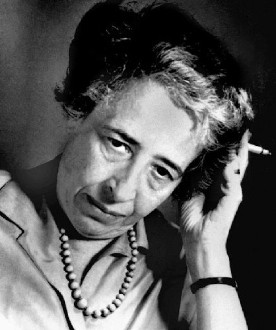Hannah Arendt Blamed Nazism on Conspiracy Theory
August 21, 2010

Review of Hannah Arendt's "The Origins of Totalitarianism." London:Andre Deutsch,1986.
by Guy Nicholls
(for henrymakow.com)
Reading this book, I was struck by the many references to "conspiracy theories". I was inspired to learn that conspiracy theories were embraced by my forebears whom Arendt refers to scathingly as "the masses."
According to Arendt, by the late nineteenth century, the conspiracy-manic masses were showing furious interest in the so-called "supra-state powers" i.e. the Jesuits, Jews and Freemasons. A huge trade was done in what Arendt refers to quaintly as "backstairs political literature" on the triple-headed conspiracy that controlled governments, instigated wars and revolutions. The crux of her argument was that the seeds of totalitarianism and the "Holocaust" were laid when the Nazis managed to corner the conspiracy market with their emphasis on the Jews who ran the the whole triple- headed conspiracy.
Arendt signals her intention to debunk conspiracy. She attempts to sell us the idea that the Jewish state bankers lost their place to a new breed of "imperialistically minded businessmen".
"The intra-European Jewish element became an object of universal hatred because of its useless wealth, and of contempt because of its lack of power" (15).
She tries to debunk Disraeli's espousal of Jewish ethno-supremacism as highly eccentric and chimeral.
Firstly,
Dizzy's Jewish ethno-supremacism seems less eccentric when set in the
context of the phenomenon of British Israelism. As Christopher Jon
Bjerknes has documented, this belief in Jewish Choseness had taken
firm root among Britain's ruling class for centuries to the point
where Victoria and her family saw themselves as King David's
descendants.
Many Englishmen like Sir Isaac Newton (1643-1727) subscribed to the Cabalistic prophecies in the Zohar about Jewish Choseness for world rule. Disraeli was no anachronism in this respect. The ground for such beliefs had been previously laid among the English themselves in publications over centuries.
Secondly, if the power of the secret societies Disraeli warned about is so "chimerical," then what does Arendt make of the fact that totalitarians like Hitler modeled their movements and governments on the successes of these same (largely Jewish) secret societies?
PERSONAL DIMENSION
For Arendt the "Jewish Question" revolved around the personal trauma she suffered with the Nazi take-over in 1933. Nothing in her assimilated, liberal and socialist background steeped in Enlightenment values and principles prepared her for what then followed.
None of this had come about by accident. These WW1 outcomes were all the ones desired by those who had orchestrated the conflict.
It
had all begun with the "permanent revolution" and perpetual
war tactic initiated not so much by Trotsky as by another Rothschild
agent called Parvus a.k.a. Alexander Helphand.
Parvus helped finance and orchestrate the Donmeh Crypto-Jewish seizure of state power in Turkey in 1908. The genocide against the Armenian Christians that followed in 1915 ensured their key positions in the army and bureaucratic elite were filled by Donmeh. Ataturk himself was one.
The Nazi leadership right up to Hitler himself were also of the Crypto-Jewish variety and backed by the same Jewish bankers. It was these Sabbatean Jews who would unleash the genocide known today as the "Holocaust." Rationalized as the fulfillment of OT prophecies re-the need for Jewish atonement for past sins this genocide targetted Orthodox Ostjuden and assimilated Jews who had no interest in going to Palestine as its prime victims.
Naturally the Sabbatean apostasy and the schism it wrought within Judaism from the seventeenth century on remain taboo in Arendt's Holocaust narrative. Given that one of her great friends was Zionist religious historian Gershon Scholem who was the first to give due weight to Sabbateanism within Jewish history, one wonders how she could have remained unaware of it.
Ironically when Arendt comes to write about the Jewish role in her book, "Eichmann In Jerusalem," she seems not to have noticed that Adolf Eichmann had Zionist contacts in Palestine, had visited in 1937, and spoke Yiddish and Hebrew was himself a full Jew! In Origins no mention is made of these Nazi-Zionist contacts that led to the Transfer Agreement of 1936 that Edwin Black had laid the basis for the economic infrastructure of the nascent Israeli state.
Again, since Arendt came to settle in New York, one wonders how she failed to notice it was home to the CFR not to mention the UN where Sabbatean Jews and Zionists had established bases of international reach and power.
Though Arendt makes no real attempt to trace what she calls the totalitarian "virus" to its real source among the Cabalist bankers and NWO globalists with whom conspiracy researchers are familiar, her description of totalitarianism in power (389-459) leaves the abiding impression that Hitler and Stalin were indeed both merely front-men for these manipulative elites.
For Arendt, the masses cannot understand that the "fortuitousness" that pervades reality is the real driving force of history (352). In the final analysis, this familiar "cock-up theory" of history puts her at odds with conspiracy theorists who view history as the product of elite manipulation.
Yet before we discard Arendt as just another establishment historian, there are enough clues in Origins to suggest that the Twentieth Century was but a dress rehearsal for the NWO. Indeed Arendt does leave us with one final insight:
Were it not for the fact as she notes that education has not been the means to instill convictions in us but rather to destroy our capacity to form any, we might by now have noticed that the left/right paradigm for political action is now utterly redundant (468,442).
"The politically most important yardstick for judging events in our time is...whether they serve totalitarian domination or not" (442).
This call to eternal vigilance is one with which conspiracy researchers today will likely readily concur.
Bibliography
http://www.kevinmacdonald.net/SAID-chap5.pdf
http://www.jewishracism.com/Jewish_Genocide_Enlarged.pdf






